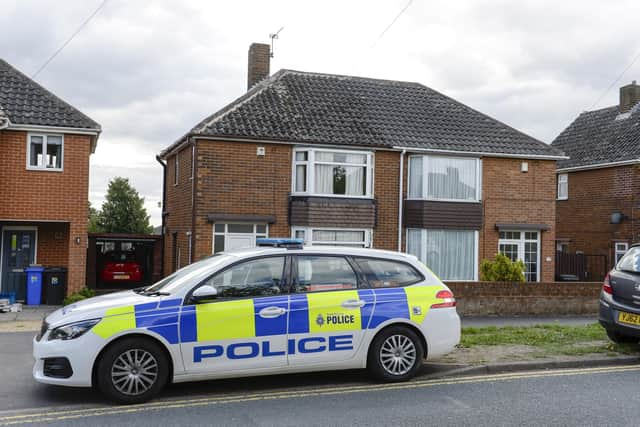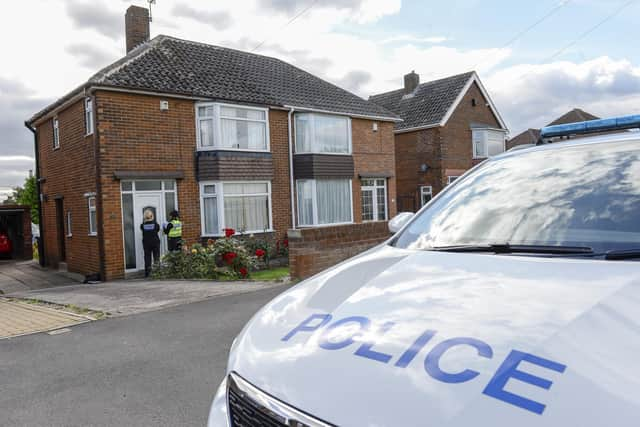Marjorie Grayson: family questions support for Sheffield woman found dead at home where she killed husband
and live on Freeview channel 276
Marjorie Grayson, aged 85, stabbed her husband, Alan, in the home they shared in Orgreave Lane, Handsworth, in September 2018.
Mrs Grayson, a retired office administrator, appeared at Sheffield Crown Court in June 2019 over the fatal stabbing, said to have occurred during a “trivial disagreement”.


Advertisement
Hide AdAdvertisement
Hide AdShe had been suffering a type of dementia, which had affected her ability to inhibit her impulses on the day of the “inexplicable” attack upon her husband.
The second day of the inquest into her death today heard concerns raised over support when she was put back in the community.
She had been placed with her family, and had started to return to the home she had shared with her husband, where the inquest heard she died in 2020.
Few details of the circumstances around her death have been given. But the cause of death was blunt force head trauma, and mention has been made of self harm.


Advertisement
Hide AdAdvertisement
Hide AdMs Combes said she would include a police statement regarding the death in evidence, but would not be reading it out.
Kirsty Dallison-Perry, deputy head of nursing for older adults with Sheffield Health and Social Care NHS Foundation, explained today how its home treatment team supported older adults with acute mental health issues to return home, and were tasked with supporting Mrs Grayson.
She told assistant coroner Abigail Combes it was felt Mrs Grayson would benefit from support – but face-to-face visits were not given because of the coronavirus pandemic. There were concerns about transmitting Covid to a vulnerable older woman.
Instead she received telephone calls, made while she was staying with relatives after her discharge from care.
Advertisement
Hide AdAdvertisement
Hide AdMrs Dallison-Perry said: “We were doing as few home visits as possible due to the seriousness of Covid.”
She said if there were concerns from the family, they would have changed and done daily meetings. But she said no concerns were flagged, and there were regular multi-agency meetings.
Ms Combes asked if her service was aware Mrs Grayson had talked about ‘dark thoughts, feeling guilt ridden, and not being able to understand why her family was still supporting her’.
Mrs Dallison-Perry said there were concerns about Mrs Grayson retaining information about lockdown, but they had mostly received ‘positive feedback’
Advertisement
Hide AdAdvertisement
Hide AdShe said she had not known a case like Mrs Grayson’s before.
Asking questions, Mrs Grayson’s daughter, Saskia Grayson, said the family was surprised Mrs Grayson had been discharged from the unit where she was previously kept.
She asked: “You say you heard positive things. Were you not aware of obstructive behaviour? That she went out and went missing? She’d sit in silence for long periods and not speak to us? That she’d go into dark and sullen moods? Was this not passed on? This is what was happening in our house, not when she returned to her house where the incident occurred. “
Ms Dallison Perry said: “What you’ve said is not what’s in the notes. Our team will have put in what we were told.”
Advertisement
Hide AdAdvertisement
Hide AdSaksia Grayson asked: “At no point were concerns raised that we as a family were expected to monitor her behaviour and understand what to look out for and know what to report? No one had told us we were responsible for mum. We’re not mental health professionals. We were grieving the loss of a family member in awful circumstances. Yet we seem to be being called out as having no concerns. I think people would find that inappropriate."
Mrs Grayson’s family also told the inquest she was deaf in one ear and had hearing problems in the other ear, and suggested speaking on the phone was not adequate.
Mrs Dallison-Perry said that had not been brought to the attention of her team, but she said Mrs Grayson had not appeared to be struggling to hear.
Her son Karl said: “I can’t understand how this didn’t filter down. How would we know you were not in communication with the social worker? I think there’s been a fundamental failure in communication with this service.”
Advertisement
Hide AdAdvertisement
Hide AdMrs Dallison-Perry said she apologised if they felt it was poor, but they had contacted the family every two to three days and would have expected the social worker to contact the home treatment team if there were concerns.
The family refuted suggestions they had supported discharge. Mr Grayson said they had been given no other options.
After the death of her husband, Mrs Grayson was initially charged with murder but pleaded guilty to manslaughter on the grounds of diminished responsibility.
She was sentenced to a hospital order under the Mental Health Act. Mrs Grayson was then transferred to St Andrew’s Healthcare – a specialist psychiatric facility in Northampton. She spent three months there before being transferred to a facility in Grenoside, Sheffield.
Advertisement
Hide AdAdvertisement
Hide AdThe inquest had previously heard Mrs Grayson ‘wanted to go home’.
Dr Velusamy Sivakumar, a consultant at the Grenoside-based unit to which Mrs Grayson was transferred, said an order imposed at Sheffield Crown Court was lifted two months after she arrived but on the basis that she remained there as an ‘informal patient’ to continue assessments.
He said Mrs Grayson eventually expressed that she “wanted to go home” – to the address where she had killed her husband.
The consultant said alternatives were discussed, including supported living and moving in with family, but she did not agree to those suggestions.
Advertisement
Hide AdAdvertisement
Hide AdHe said the pandemic speeded up the process of her returning home and the same level of support that would normally have been available “did not happen” to the same extent.
She was referred to a community mental health team and Dr Sivakumar said Mrs Grayson had not expressed anything which suggested she posed a risk to herself,
Assistant coroner Ms Combes adjourned the hearing until tomorrow.

